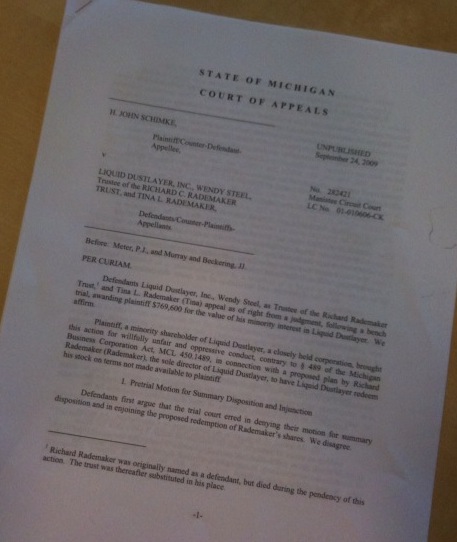 On September 24, 2009, the Michigan Court of Appeals issued an important decision on the rights of minority shareholders in Michigan corporations. The Michigan Business Corporation Act allows a minority shareholder to bring a lawsuit in circuit court if “the acts of the directors or those in control of the corporation are illegal, fraudulent, or willfully unfair and oppressive to the corporation or the shareholder.”
On September 24, 2009, the Michigan Court of Appeals issued an important decision on the rights of minority shareholders in Michigan corporations. The Michigan Business Corporation Act allows a minority shareholder to bring a lawsuit in circuit court if “the acts of the directors or those in control of the corporation are illegal, fraudulent, or willfully unfair and oppressive to the corporation or the shareholder.”
In Schimke v Liquid Dustlayer, Inc., the plaintiff owned less than 1/3 of the stock of the corporation. The two other shareholders, who were also in control of the board of directors, planned to have their own stock in the corporation redeemed (purchased by the corporation), but the minority shareholder’s stock would not be redeemed. The plan was never completed. The circuit court ordered that the corporation must redeem (purchase) the stock owned by the minority shareholder as a remedy for the actions of those in control of the corporation.
The defendant majority shareholders argued that the corporation should not be required to purchase the stock of the minority shareholder, because their plan was not actually carried out. The Court of Appeals ruled that the circuit court may intervene before an action is finalized, and may order a corporation to purchase a plaintiff’s shares of stock as a result of the defendants attempt to take an unfair and oppressive action.
The defendants also argued that they did not violate the rights of the minority shareholder because there was not a “continuing pattern of oppressive conduct.” The Court of Appeals ruled that a pattern of conduct was not necessary for the minority shareholder to bring a claim. Rather, “a single ‘significant action’ is sufficient to show willful and oppressive conduct.”
This decision expands the rights of minority shareholders to make claims of minority shareholder oppression, and makes it easier for minority shareholders to force the corporation to purchase their shares of stock.
Click to Download Case from Michigan Court of Appeals in PDF Format
This article was written by Mark S. Demorest, Managing Member of Demorest Law Firm.



